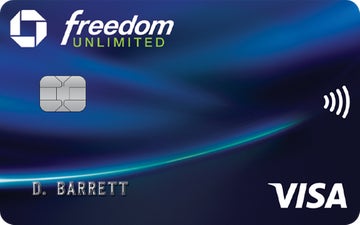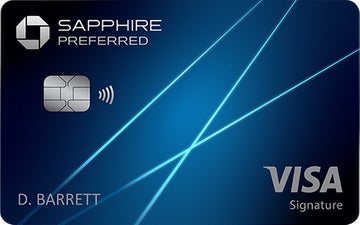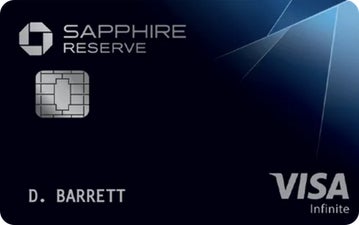With dozens of great credit card options on the market, it’s useful to take time to pause and figure out what type of card works best for your lifestyle before you open a new account.
Should you sign up for a card that offers cash back, points, or miles rewards? Do flat-rate rewards or tiered bonus categories best fit your budget? Do the extra perks and benefits matter? And if there’s an annual fee — is it worth it?
Two of our favorite credit cards for everyday users today come from popular card issuer Chase — the Chase Sapphire Preferred® Card and Chase Freedom Unlimited®. While we like both, figuring out exactly what you’re looking for in a rewards card can help you determine which makes more sense for you. Both cards have enticing rewards structures and perks, but the first is a travel rewards card with a $95 annual fee while the second is a cash back card with no fee.
It could even make sense to carry both cards in your wallet to unlock even greater value and savings. You’ll want to make sure you’re financially ready to juggle multiple credit cards and your credit score is in a good place before applying — if your balances pile up, the cost of interest will take away from any of the rewards or benefits that come with your card.
Here’s a look at how the two cards compare, and how you can choose which makes sense for your wallet.
Side-by-Side Comparison
| Chase Sapphire Preferred | Chase Freedom Unlimited | |
|---|---|---|
| Annual Fee | $95 | $0 |
| Welcome Offer | 100,000 points if you spend $4,000 in the first three months from account opening | $200 bonus after spending $500 within three months of account opening |
| Rewards | • 5x points on travel purchased through Chase Ultimate Rewards
• 3x points on dining (including eligible takeout and delivery), online grocery purchases, and select streaming services • 2x points on all other travel purchases • 1x points on all other purchases |
• 5% cash back on travel purchases made through Chase Ultimate Rewards
• 5% back on grocery store purchases (up to $12,000 spent) in the first year • 3% cash back on dining (including takeout and eligible delivery) and drugstore purchases • At least 1.5% cash back on other purchases |
| Other Benefits | • 25% redemption boost on points redeemed for travel through Chase Ultimate Rewards or eligible statement credits via Pay Yourself Back
• 5 points per $1 spent on Lyft rides through March 2022 • Earn up to $60 in statement credits toward Peloton membership through Dec. 2021 • Complimentary 12-month DashPass from DoorDash subscription (activate by Dec. 31, 2021) • Travel and purchase protections |
• 0% introductory interest offer on purchases for the first 15 months after account opening, followed by a variable APR of 14.99% – 23.74%
• 5% cash back on Lyft rides through March 2022 • Complimentary 3-month subscription to Doordash’s DashPass followed by 50% off DashPass for 9 months • Travel and purchase protections |
Bonus Comparison
The Chase Sapphire Preferred is a clear winner in this category, thanks to its 100,000-point welcome bonus. But you’ll need to spend at least $4,000 in the first three months of opening the account to earn it. Those 100,000 points are worth around $1,250 when redeemed for travel through Chase Ultimate Rewards, according to Chase.
The Freedom Unlimited’s welcome bonus is much easier to obtain, offering $200 after you spend $500 within three months of account opening. You can also get 5% cash back throughout your first year (up to your first $12,000 spent) when you use your card at grocery stores. The grocery bonus excludes purchases made at Walmart or Target.
Rewards Comparison
Both of these cards offer competitive rewards rates, but your best value will depend on your lifestyle and the kind of purchases you make.
The Freedom Unlimited is NextAdvisor’s pick for the best cash back credit card for a reason: You’ll earn 5% cash back on travel booked through the Chase travel portal, 3% cash back on dining and drugstore purchases, and 1.5% cash back on all other purchases. You can maximize the rewards you earn by swiping your card within bonus categories. But it also makes a great go-to for any spending that doesn’t fit within the bonus categories on this card or any other in your wallet. All non-bonus spending still earns 1.5% cash back — a step up from the typical 1% you’ll earn outside of bonus categories on most cards.
You’ll also earn 5% cash back on Lyft rides through March 2022, plus a complimentary three month subscription to Doordash’s DashPass followed by 50% off DashPass for nine months. The card comes with Chase benefits such as purchase protection, auto rental damage collision waiver, and other travel protections.
Meanwhile, the Sapphire Preferred offers higher-than-average redemption rates for travel, the ability to transfer points to travel partners, and extensive travel and shopping protections. The Sapphire Preferred card earns you 5 points on travel purchased through Chase Ultimate Rewards; 3 points per dollar on dining, online grocery purchases, and select streaming services; 2 points on all other travel purchases; and a decent amount of extra perks.
You can also earn 5 points per $1 spent on Lyft rides through March 2022, get $60 in Peloton membership credits through Dec. 2021, and a year of DoorDash DashPass membership worth up to $9.99 per month (when activated by Dec. 31, 2021). If you use them, the Peloton and DoorDash benefits alone would more than offset the annual fee. Additionally, the Sapphire Preferred’s primary auto rental insurance beats the Freedom Unlimited’s damage collision waiver, which acts as secondary insurance within the U.S.
Both cards give you access to the Chase Ultimate Rewards portal, where you can boost the points you earn via Chase’s Pay Yourself Back option through Sept. 30. The Freedom Unlimited yields a value of 1.1 cents per point when you redeem toward dining purchases you make with the card, and 1 cent per point on everything else.
The Sapphire Preferred always earns a boosted redemption rate of 1.25 cents per point for travel booked via the Ultimate Rewards portal, but Pay Yourself Back extends the boost to statement credits toward dining, grocery stores, or home improvement purchases. That means every 10,000 points you earn on the Sapphire Preferred can be redeemed for $125, rather than $100 for cash and gift cards.
APRs
The Chase Freedom Unlimited is the only one of these two cards to offer an introductory APR. You’ll get 0% APR on purchases for 12 months, followed by a variable APR of 14.99% to 23.74%. This can be useful if you have a large purchase to make and want to pay it down without interest over time — as long as you have a plan to pay off the balance before the intro period ends.
The Sapphire Preferred incurs a variable APR of 15.99% to 22.99% once you begin using the card. If you’re trying to consolidate high-interest debt from other cards or want to save on interest from large purchases, the Sapphire Preferred isn’t the best choice.
Fees
The no annual fee Chase Freedom Unlimited wins this category. The Sapphire Preferred carries a $95 annual fee — that’s significantly lower than its higher-end sister card, the Chase Sapphire Reserve® — but it could be a drawback if you have a tighter budget or simply don’t want to pay a fee for a credit card.
However, you can easily recoup the Sapphire Preferred’s annual fee if you travel frequently and take advantage of its added benefits. Plus, it has no transaction fees for purchases you make abroad, while the Freedom Unlimited charges a 3% foreign transaction fee.
Both cards incur the same late payment and returned payment fee amount of up to $40.

Chase Freedom Unlimited®
- Intro bonus:
- Annual fee:
$0
- Regular APR:
14.99% – 23.74% Variable
- Recommended credit:
670-850 (Good to Excellent)
- Learn more at our partner’s secure site.

Chase Sapphire Preferred® Card
- Intro bonus:
- Annual fee:
$95
- Regular APR:
15.99% – 22.99% Variable
- Recommended credit:
670-850 (Good to Excellent)
- Learn more at our partner’s secure site.

Chase Sapphire Reserve®
- Intro bonus:
- Annual fee:
$550
- Regular APR:
16.99%-23.99% Variable
- Recommended credit:
740-850 (Excellent)
- Learn more at our partner’s secure site.
Deciding Between Chase Sapphire Preferred and Chase Freedom Unlimited
When it comes to maximizing value, we believe these two Chase cards actually make a powerful duo together. Maximize your earnings by strategizing which card’s bonus categories will earn you the most at checkout, then transfer points earned with the Freedom Unlimited to your Sapphire Preferred account to pool the total and boost each point’s value to 1.25 cents via the Ultimate Rewards portal.
But if you have to pick one, the Freedom Unlimited offers more everyday value for nearly every cardholder, whereas the Sapphire Preferred offers tiered rewards more geared toward travel. The Freedom Unlimited’s rewards structure is flexible and straightforward, and you’ll get at least a guaranteed 1.5% on every purchase you make. On top of that, it offers a 15-month introductory 0% interest period on new purchases (then 14.99 – 23.74% variable APR), a great welcome bonus, and added partner benefits — all for no annual fee.
The Sapphire Preferred carries a $95 annual fee, but the boosted redemption rate and travel rewards can make that well worth it — if it aligns with your spending. Plus, the 100,000-point welcome bonus is one of the most lucrative on the market today. Even though its rewards are focused on travel, you may be able to secure bonus points for more purchases than you think, thanks to Chase’s broadly-defined categories. For example, dining can include fast food, delivery, and even your daily coffee. Travel purchases can consist of hotel reservations, rideshare services, and more — even public transit. If you’re looking for a lucrative welcome bonus and want to earn points that you can later redeem for free travel, Sapphire Preferred is still one of our favorite cards right now.